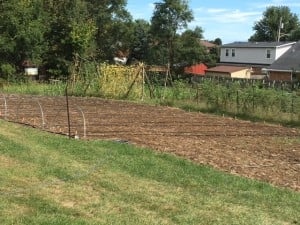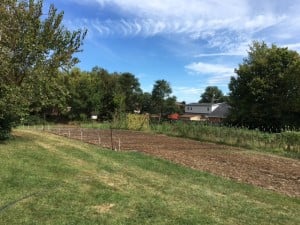Michele Gore, reporting for the Episcopal Church of Our Saviour in Richmond.
August has been a busy, transitional month for us at ECOS. The summer crops are winding down and we have been preparing the soil and setting up low tunnels for the fall crops. We’re also treating the soil and looking ahead to next year. This will be our first year of a significant fall planting and growing season and we’re excited about the continuation of our production. Several hundred carefully nurtured seedlings have just been transplanted into the newly tilled fall garden plots. Thanks to the Grow Appalachia staff for letting us use their tiller!
We were pleased to produce and distribute peppers, squash, tomatoes, okra, beans, and potatoes to the Salvation Army, Hope’s Wings domestic violence shelter, Migrant Head Start Families, the Berea Food Bank, St. Thomas Food Bank, the St. Paul AME Church in Richmond, and a new outlet, the Heavenly Blessings Soup Kitchen and Mission. We have fed hundreds of hungry people in the Madison County area and hopefully will continue our work through the end of the year.
Early in the month the dreaded yellow striped army worm invaded the beans, tomatoes, and cucumbers. Unfortunately the cucumbers could not be saved and had to be dug up and thrown away. The tomatoes and beans were salvaged by spraying BT thoroughly and persistently on the plants. The lack of rain negatively affected our peppers. newly planted corn, and tomatoes and they are just beginning to catch up. While we were frustrated with all that, deer decimated the remainder of our summer and fall squash crops. Northern Madison County now has very well-fed deer. To deal with the drought, our master gardener, Phillip Haug, established an elaborate drip irrigation system to salvage the existing crops and help establish the newly planted fall plants. All our volunteers and our garden assistant are learning by trial and error, attending classes, and by reading our organic gardening books faithfully. We have come a long way since March.
The Migrant Head Start children’s crops are finishing up with some peppers and tomatoes still to come. The Salvation Army youth group’s raised bed gardens have been producing, but it’s been a challenge to keep the youth motivated to do the boring, but necessary, maintenance tasks.
As we move into fall, we look forward to yields of beans, tomatoes, spinach, corn, lettuce, carrots, beets, and peppers. We have accomplished a lot, but there is more to do.




Leave A Comment